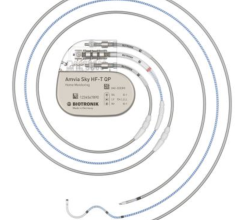
January 4, 2022 – Remote patient monitoring and cardiac data management solutions vendor Implicity received U.S. Food and Drug Administration (FDA) clearance for a novel medical algorithm that analyzes ECG data from implantable loop recorders (ILRs). The newly 510(k) cleared ILR ECG Analyzer is an algorithm based on artificial intelligence (AI).
“This is an important step for Implicity as we expand in the U.S. market,” said Dr. Arnaud Rosier, CEO and founder of Implicity. ”With FDA clearance, our AI product can now be used in combination with implantable loop recorders to improve arrhythmia detection and help electrophysiologists and their teams avoid wasting time reviewing non-actionable events.”
The a fast-growing implantable cardiac monitor (ICM) market is expected to double over the next decade. The increasing volume of data generated by these remote monitoring devices represents an important and increasing pain point for medical staff who spend significant time processing a high number of false-positive atrial fibrillation (AFib) detections.
“Excessive false positives from ILRs are very common. There’s a high positive rate with many events that are considered arrhythmias, that in fact, are not arrhythmias. These false positives significantly burden clinicians who need to sift through the noise and adjudicate misclassified abnormalities. Implicity’s algorithm significantly reduces this workload,” said Dr. Arnaud Lazarus, electrophysiologist at Clinique Ambroise Paré.
Medical device maker Medtronic recently announced an AI algorithm to address the false positive issue, but it is only for use with the Linq II model. Implicity’s solution is compatible with all previous Medtronic models (i.e. Reveal Linq, Reveal XT, and Reveal DX), which are implanted in the majority of patients, the company said.
Implicity’s ILR ECG Analyzer applies AI to the heart rhythm data collected by the specified Medtronic models. The digital medical device will be integrated into Implicity’s cardiac remote monitoring platform to deliver unique value to electrophysiology teams by laying in additional signal processing and analysis to improve the accuracy of irregular heartbeat detection. The information is then automatically classified to help prioritize true events (i.e., those that warrant further action), which provides more meaningful and efficient event management.
A recent study published in the European Heart Journal demonstrated Implicity’s novel algorithm reduced the number of false-positive episodes by 79% when analyzing ECG recordings from patients implanted with Medtronic ILRs while maintaining 99% sensitivity.[1]
“I am excited by the potential this technology has to transform the practice of remote patient monitoring,” said Prof. Niraj Varma, M.D., Ph.D., a professor of medicine and consultant electrophysiologist at the Cleveland Clinic. “The true promise of remote monitoring is that we can see patients who need to be seen earlier. Even if the patient is not experiencing a symptom, we can detect their condition and let them know they need to be seen. Implicity’s innovative solutions will enable us to direct our attention to clinically actionable data better so we can do just that.”
About Implicity Remote EP Device Monitoring
Implicity provides a remote monitoring and research platform used by independent diagnostic testing facilities and cardiac electrophysiology (EP) centers to deliver high-quality care for patients with connected cardiac implantable electronic devices. On this platform, Implicity aggregates normalizes, and standardizes data from any implantable cardiac device across all manufacturers. Implicity also carries out R&D on AI-based algorithms aiming at improving patient care and serving the future of preventive medicine. The company has been the first private company authorized to access the Health Data Hub*, one of the largest databases of patients with heart diseases in the world, supporting the development of its AI solutions. Implicity covers more than 50,000 patients in over 80 medical facilities across Europe and the United States.
For more information: www.implicity.com
Reference:


 July 02, 2025
July 02, 2025 









